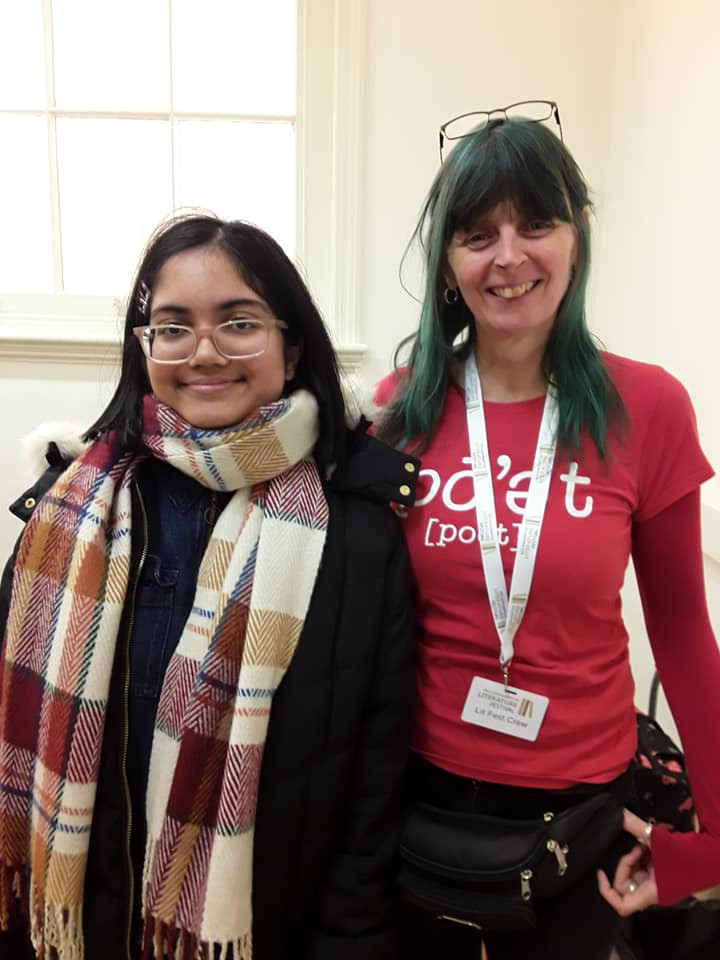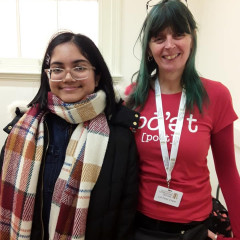What is it like being a poet and performer?
I love working as a writer and performer. It’s not easy sometimes to make a living at this sort of work (and it’s just become significantly harder due to COVID 19). I’m quite happy living a hand to mouth existence, so I manage…so far anyway. Being creative with words is massively important to me. I’ve always written. I had my first poem published when I was six or seven. It’s something I feel I have to do to make sense of the way I engage with the world. I feel privileged to have been able to make a living at it for the last 10 years or so. If you like an erratic lifestyle, where no two days are the same, then it could be the job for you ☺
How would you describe your work in your own words?
I write poetry, prose, theatre pieces, and sometimes work on oral history books. I’m predominantly known as a performance poet, but really I take on any writing commissions I’m offered. It is better to know yourself to be a writer rather than a poet as this increases your scope to find work. I also spend lots and lots of time facilitating workshops. There is a lot of planning involved in workshops. I also do mentoring. This sort of work is the work that pays. Books and performances do not bring in much income when you are working at a grassroots level. Even very well-known poets seldom make a living solely from their poetry. Many are attached to universities as lecturers on creative writing courses. Many poets have a day job. Sometimes I write in Black Country dialect, and sometimes I don’t. I used to do a lot of character and prop-based poetry shows. Nowadays I write a lot more poetry for the page than I did.
I know that you do a lot of work with young people. What other audiences would you like to cater for?
I work with all ages, all backgrounds, all abilities. I’ve worked in all sorts of places facilitating workshops, from care homes to hostels, Plus, schools, colleges, universities. I’ve run walking workshops, workshops on narrowboats, and even worked in caves! I’ve worked with babies up to people over a 100 and everything in between.
How did you begin initiating poetry events?
As a performer I didn’t start doing gigs until I was nearly 40. I was quite shy, believe it or not. It took me a long time to work out that performing was what I should be doing. There weren’t any events in Wolverhampton when I first started, so I worked with the local Literature Development Officer to set some up. My motto is, if it’s not there then create it. I’ve run a lot of different events over the past 10 years. And now we’re doing them online which is really interesting.
Take me through the process of publishing your first book.
I am published by a couple of small presses. They both approached me and asked to publish as they’d seen me perform. I had CDs published first before books. The process for my children’s book was very different from my adult books. The children’s book was a labour of love and I worked very closely with the publisher and a children’s illustrator to get a product that we were all very proud off. Poetry books don’t sell many copies generally (although, there are exceptions). If you look at the number of sales that constitutes a best seller in poetry you might be surprised. My kids’ book sold 1,000 copies and that is that publisher’s best-selling work. Somebody like the performance poet Spoz sells thousands of books in schools…but you won’t see it on any mainstream figures because he’s a performance poet and not mainstream or living in London. My adult books were more a case of sending in a manuscript as requested and going along with suggestions made by the publisher. These books sell online via Offa’s Press, and I sell a few myself by gigging. Before lockdown I was regularly performing all over the country at small spoken word nights. I’d usually sell 5 or 6 copies a night on average. The publisher also has an online shop, so they also sell that way. I get paid annual royalties from both publishers. The amount is a small percentage of the cover price. Writers can also register their books with ALCS and will get a small payment from them each year too.
How did you enter the poetry 'industry'? What sparked it?
I’ve always written…I needed an outlet. I didn’t see it as an industry when I set out. I’m not sure it’s joined up enough to call it an industry.
Is it a competitive place to be in?
At the level I work at I’ve always found it to be really supportive. I’ve met some lovely people who are very giving.
Were you apprehensive about anything before making an entry?
It wasn’t really a deliberate entry into anything. I just did what I did…and now I do what I do and hope for the best.
Were there any surprises for you got involved in the poetry industry?
Nothing I can think of. I’ve been fortunate. Although I’m not a well known poet I’ve had some great gigs. I’ve supported John Hegley, Holly McNish, Carol Ann Duffy. I’ve performed at some fabulous festivals such as WOMAD, Latitude, Solfest, Shambala etc. I’m always surprised when I get invitations to do stuff. And I’ve been asked to be part of some amazing projects.
What difficulties did you have while entering the industry?
Every job has challenges. Being self-employed you have to try and plan your own time effectively, and sometimes that’s difficult because you can get loads of work all at once and then periods of time when there is none. You also have to budget your money very carefully to make sure you can support yourself in the mean times and lean times. It’s also true that sometimes I don’t get time to write! That sounds ridiculous but it’s true, so much of my work is admin, organizing events and running workshops.
What is your favourite part of being involved in such a dynamic industry?
I love poetry. I love people. I love performing. I love seeing different places and going to festivals. And that’s part of what the job is.
Have there been times when you wished you were not part of the industry?
No, but like I say, I kind of do my own thing, and that means I have an element of control.
What are your tips for making it far in the industry?
My tips probably would not be to see it as an industry, rather see yourself as a writer. If you do that then you can get work in places that aren’t even connected to ‘the industry’. I’ve done all sorts of writing related things that are linked to other areas such as transport, the glass industry, local councils etc. I would say to be a writer you should read and watch as much poetry and theatre as you can. Experiment with your writing. Find your own voice. Take support where it’s offered. Support other writers when you can. Keep being eager to learn. Say yes to the things you are offered, and then find a way to pull them off even if you are a bit doubtful that you can initially. Learn to take criticism and rejection. Criticism is a good thing when given as feedback. There will be rejections. Rejection isn’t necessarily because your work is bad, it’s just because it doesn’t fit in a certain place at a certain time. You have to find where your work fits. Or change your work to make it fit. Enjoy those challenges and it becomes easier to handle.
What is your advice for young people wanting to take poetry as a profession?
Always have a fall-back position! Initially you will probably need to have a job that isn’t being a poet. You might find a job that is linked to the publishing industry, but being a poet is a role that takes time to carve out. There is poetry to be had from any job you do, of course. I’ve been all sorts of things over the years, and that provides great writing material. I’ve only been a full-time poet in the last ten years or so. It could be that eventually you do end up being a full-time poet, but the income is fairly small, the money from books is teeny tiny (unless you are very, very lucky). Diversify and realise early on that a big part of being a poet as a profession is about sharing your skills with other people. Build up a publishing track record and a reading/performing track record. Enter competitions. Send to small press magazines. Put your work out there in as many ways as possible. Each piece you do needs to find its home. Keep learning. Keep developing. Be realistic.
What are your ambitions for the future?
I take on projects as they come. I don’t have ambitions really. I go with the poetry flow. Currently all ambitions and plans have been thrown into question anyway. Many poets lost all of their bookings, income and projects the day lockdown happened. That’s a big reality check. We didn’t see that coming! Much of our work has gone online. We are finding new ways of working. We are trying to find out how to monetise this new way of working so that we can pay our bills. It’s in a state of flux…which is exciting…but also very scary for people who make their living from the arts. I hope that hasn’t put you off. It isn’t intended to. The main thing is wherever you and whatever you are doing, keep writing and loving writing. Take pride in making what you write the best you can make it.









0 Comments